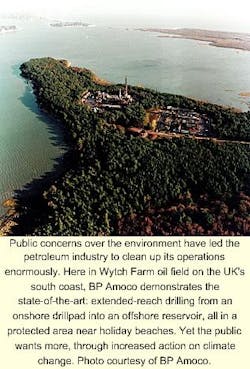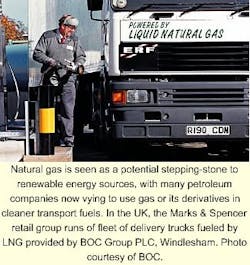One theory current among paleontologists is that the age of the dinosaurs was ended comparatively abruptly by dramatic climate change brought about by the impact of a huge meteor in the Gulf of Mexico area.
A further theory is that all the dinosaurs did not die out after the blast-some just evolved and got smaller; modern birds have been shown to be direct descendants of one group of dinosaurs.
These two theories are good analogies for what will happen to the petroleum industry over the next 100 years: Unless they begin to evolve, many oil companies will become just as extinct as the dinosaurs, and the process of evolution may require the survivors to shrink.
The meteor
The meteor did not kill enough dinosaurs directly to make a difference, but the climate changes brought about by its impact did.
The strength of the impact is thought to have been such that an enormous cloud of dust was thrown up into the atmosphere, creating a spreading black pall that eventually led to the deaths of plants that were the key link in the dinosaurs' food chain and ultimately to the deaths of the dinosaurs themselves.
The meteor impact theory is just that-a theory. There are academics for it and against it, and both sides of the debate have teams of scientists working hard to prove the theory or replace it with a better one. Just like the dinosaurs, oil companies could have their "food sources"-investment capital and sales of hydrocarbon commodities-dramatically curtailed as an effect of the climate change issue.
While the dinosaurs were killed off by actual climate change, some of the majors are likely to be killed off by public thinking about catastrophic climate change, popularly perceived as global warming. The companies' perception of this danger will determine whether they behave like dinosaurs and become extinct or whether they evolve like the ancestors of birds.
Looking towards the new millennium, most petroleum companies, and certainly all the majors, have made tremendous improvements in the environmental performance of their operations. Yet it is already possible to identify those companies that are in danger of extinction and those that have begun to evolve in response to this latest environmental challenge.
The dinosaurs
The global warming theory identifies the burning of hydrocarbons as a major source of gases such as carbon dioxide and sulfur dioxide, which work in the atmosphere like the glass of a greenhouse, making the air hotter.
Numerous measurements by groups of scientists suggest that the earth's atmosphere is changing, with higher air temperatures, more-turbulent weather, and melting ice caps all symptoms of a possible long-term threat that is causing great public concern. Some attribute this to human activity that produces greenhouse gases in excess of those produced naturally, others to the earth's normal cyclical heating and cooling patterns that are evident from geological studies.
The guiding principle of scientific research is that a theory is valid until it is disproved. While the majority of scientists see growing evidence for the catastrophic global warming theory, many have doubts, and the vast majority accept that the theory has not been conclusively proved.
But it has not been conclusively disproved, either. This lack of full proof either way has split scientific opinion into three camps: those who accept the global warming theory as valid; those who reject it; and those who say that, whether the theory is valid or not, we should act to alleviate the potential threat before it is too late.
In the petroleum industry, only two of these camps are represented in any significant numbers: those who reject the threat of catastrophic global warming outright, and those who advocate the precautionary principle. History may show that the rejecters are the industry's potential dinosaurs, while the precautionary-principle brigade are the future birds.
Exxon's approach
Exxon Corp. is one of a number of petroleum companies in the Global Climate Coalition (GCC), a group of companies from a wide range of industries that fights to prevent legislation being enacted in the name of catastrophic global warming-before the theory has been proved.
In the public mind, Exxon is linked with the massive oil spill in Alaska's Prince William Sound on Mar. 24, 1989. Then the Exxon Valdez tanker ran aground, depositing 262,000 bbl of crude oil into the sound, leading to the pollution of 700 miles of coastline and the deaths of hundreds of thousands of birds and animals.
In 1999, environmental campaign group Greenpeace, a firm believer in the theory of global warming and a shrewd opponent of polluting industries, made sure the 10th anniversary of the Exxon Valdez spill was marked.
"Exxon tried to pass off the Exxon Valdez as a freak accident," said Greenpeace, "that only happened because Capt. Joseph Hazelwood had been drinking before taking command of the ship.
"However, although Capt. Hazelwood deserves-and has received-a fair share of the blame, a number of Exxon's policies also contributed to the tanker's grounding. These ranged from cutting back on personnel, to encouraging captains to get up to sea speed as soon as possible, to continuing to build single-hulled tankers even after promising double-hulled ones."
Greenpeace's marking of the Exxon Valdez anniversary formed part of a continuing campaign to persuade the UK government to stop further exploration and production in the Atlantic Frontier area off northwestern Scotland-and the environmental campaign group persists in linking oil drilling not only to spills but also to the oil industry shifting investment to renewable energy sources in light of postulated catastrophic global warming.
"As the new forms of deepwater oil developments spread through this fragile frontier," said Greenpeace, "past experience suggests that it is not a question of if a major oil spill happens but when.
"Rather than subsidizing new oil developments with a lax tax regime, the government should be directing investment and subsidy to the commercial development of renewable energy."
Since the Exxon Valdez spill, the company has worked to keep its name out of the headlines, and its reaction to almost all criticism has been silence. Behind the scenes, though, Exxon has been working on a number of important environmental issues.
In May 1999, Innovest Strategic Advisors Inc., Toronto, praised Exxon's work with GM, Toyota, and Renault in the development of low-emissions gasolines and rated it the second-best environmental performer in the US oil and gas industry, after Royal Dutch/Shell.
Innovest said Exxon was motivated by the significant adverse effects of the Valdez incident to develop a highly rated environmental framework to reduce environmental impacts and improve performance.
However, Innovest adds: "Exxon's vocal opposition to greenhouse gas emissions reductions, in favor of voluntary action and investment in new technology, detracts from its rating."
The GCC, in which Exxon is a driving force, identified a group of scientists who are skeptical of the global warming theory and supports them in joining the public debate over climate change so as to cast doubts on the science supporting the theory.
Beyond casting doubts on the science, however, GCC does nothing either to disprove the global climate theory or put forward a better solution.
In focusing on the doubts over climate change science, however, GCC and Exxon may be missing the point of the argument.
Public interest in the climate change issue is vastly greater than public understanding of climate change science. And the public has grown to distrust all big companies, including petroleum companies, on all issues where public and corporate interest are at odds. Exxon Valdez was a key contributor to this.
Increasingly, both institutional investors and the gasoline-buying public are using their main power-where to spend their money-to make their opinions known. The Brent spar backlash in Europe against Shell showed how this works: the company's retail stations in Germany lost millions of dollars worth of sales as ordinary customers protested.
Ultimately it will not matter whether the public grasps global warming science or not, or whether the theory is true or not. If they were in the mood to protest, investors and customers could bankrupt any petroleum company well before the rights and wrongs of the issue could be solved.
Evolution
The Brent spar furor was about Shell's plan to dump an idled oil loading buoy at sea and not about global warming, yet it played a critical role in the climate change debate.
Public fury at Shell's plans to dump the spar in deep water was enormous and unexpected, and went in the face of thorough research by Shell that showed the environmental impact of dumping the buoy would probably be less than for the ultimate solution-taking it ashore for dismantling and disposal.
Yet rather than duck its head until the furor had passed, as Exxon first sought to do with the Valdez spill, Shell decided to listen to the opinions of the public, having learned the hard way that customers were willing to boycott Shell products.
After much soul-searching, a completely new Shell emerged. The company's strategists looked way into the future and saw the potential for renewable energy, and its leaders redesigned the company to allow it to move slowly in this direction.
Shell began to evolve by investing $500 million over 5 years to set up a new renewable energy business. This was focused on solar power and biomass power technology, but the company also began a study into prospects for wind power and declared it had an open mind on any other form of renewable energy technology.
Crucially, the Shell leadership also made the first declaration within the petroleum industry of a determination to pursue the precautionary principle in its operations.
While Shell will continue to be one of the world's big three oil and gas producers, the company has recently started work on a number of solar and biomass power projects, it has starting working with car makers to develop fuel cells, and it has begun development of a proprietary process to produce hydrogen-viewed by many as the fuel of the future-from natural gas.
Shell Chairman Mark Moody-Stuart said: "We need to show, through action, that there is a clear path for the future development of our industry that will benefit future generations.
"This is why we wholeheartedly embrace sustainable development and work to ensure our actions meet the needs of the present without compromising the ability of future generations to meet their own needs.
"Far from being a drag on our performance, such a commitment helps us to understand the world better and improves our chance of success. Sustainable development is forward-looking, embodies the notion of progress, and encourages new liberating ways of interpreting the world."
After Shell "came out" on the climate change issue by advocating a precautionary approach, British Petroleum Co. PLC, which later became BP Amoco PLC , made a number of headline-grabbing statements along similar lines. BP Amoco also began to build its own solar power business. John Browne, chief executive of BP Amoco, has so often spoken on environmental issues that he has become a figurehead for the petroleum industry's precautionary principle supporters.
Browne spelled out his views at the Natural Environment Research Council annual lecture in London in June 1999, stating that, in the new millennium, people will want a better alternative to the trade-off between economic growth and rising living standards and a decent environment.
"They recognize the seriousness of the environmental debate," said Browne, "but they don't want gestures and rhetoric-they just want some practical ways forward.
"They recognize that there is no certainty about the science on issues such as climate change-as Karl Popper said, all science is provisional-but equally they accept that we can't wait for certainty or for the perfect answer.
"If you smell smoke, you don't wait for the house to burn down before you start to do something. And this organization has shown again and again that there are many things that can be done."
Browne notes that, while energy is only one aspect of the environmental problem, because of the growing world population-expected to rise by 1 billion over the next 10 years-soaring energy demand poses one of the most severe threats to the world's environment.
If each of these additional people consumes as much energy as the average Chinese citizen does today, said Browne, then the world will be consuming an additional 14 million b/d of oil or oil equivalent by 2010-"and that's probably a minimum figure."
This means, he continued, that those of us who make our living in the energy business have a responsibility to provide some better alternatives than the harsh trade-off between economic growth and the environment.
"I hope and believe," said Browne, "that we can demonstrate that a progressive, rational approach can produce positive results. To me, the approach is about working out what can be done now, with existing knowledge and existing technology, and applying it in the most effective way possible.
"All our experience suggests that each step we take will then open the way to more and more possibilities. It is impossible to see the end of the process, just as it was impossible 20 years ago to imagine the progressive advances that have transformed the computer-or the offshore drilling rig.
"The key thing is not to know the whole solution, or to wait until you have solved every problem. They key thing is to begin. And where should we begin? We have to start with technology."
Question mark
As the century develops and public militancy over climate change begins to kill off the "dinosaurs" within the petroleum industry, how the industry's "birds" will evolve is open to question.
Renewable energy projects today are usually small-scale and very localized. Maybe the birds will grow smaller over time through splitting off enterprises; maybe they will be able to retain their mass through operating a large number of small schemes.
The one certainty is that only those companies that are prepared to evolve now will be around to profit from meeting society's energy needs in the year 2100.
So far, only a handful of companies have prepared themselves for evolution; it is hoped the others will recognize, before it is too late, that public perception and not science is driving the global warming debate.
The Author
David Knott is Associate Chief News Editor of Oil & Gas Journal and writes the magazine's weekly Watching the World column.





